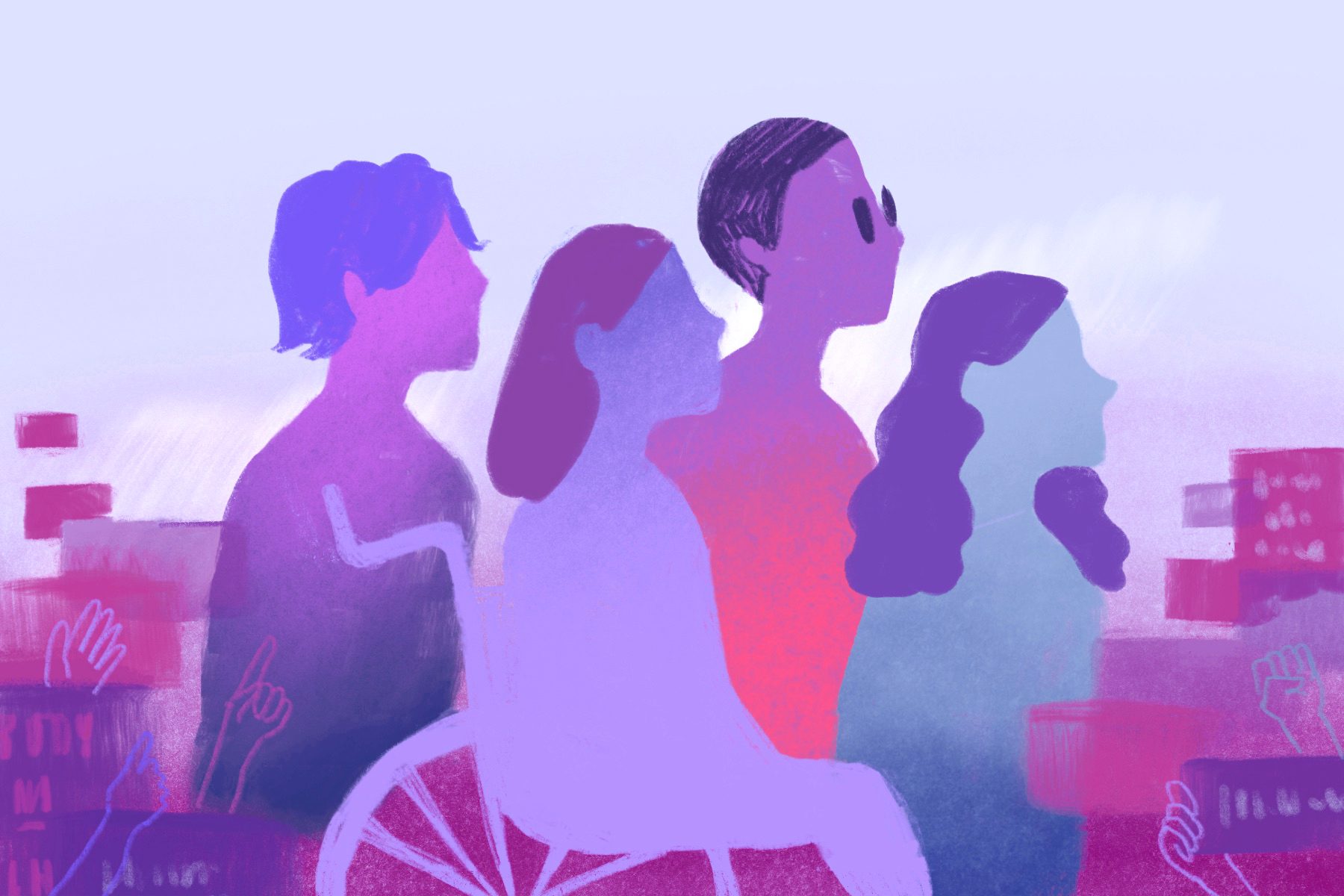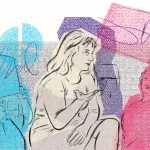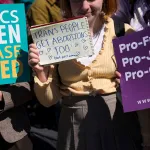Disability has been used as something of a political football in the abortion debate. For decades, fetal abnormality and disability have been part of abortion-rights advocates’ argument that people need access to the procedure. Anti-abortion advocates, meanwhile, argue that disability-motivated abortion is discriminatory and devalues disabled life.
But people with disabilities themselves have been largely absent from the public debate on abortion rights. Now, new poll results, shared exclusively with The 19th, shed light for the first time on how people with disabilities view the issue.
Pollsters have been checking the temperature on abortion since the 1970s. They’ve asked respondents about their race, gender, religious beliefs and more. They have not, however, asked respondents if they are disabled, even as some polls asked whether abortion is acceptable in cases where the “child would be mentally disabled.”
The new poll, conducted by progressive firm Data for Progress, suggests that the opinions of Americans with disabilities are largely similar to the opinions of non-disabled Americans. The polling was done after Politico reported on a leaked Supreme Court draft opinion that would overturn Roe v. Wade.
The Data for Progress national poll indicates that 55 percent of non-disabled people and 53 percent of people with disabilities believe that abortion should be legal in most circumstances, which largely reflects recent data from other polling firms.
Fifty-eight percent of all respondents would prefer for Roe v. Wade to remain in place, while 59 percent of people with disabilities feel the same way.
“Disabled Americans support abortion,” said Matthew Cortland, a senior fellow at Data for Progress who has been leading the effort to include disabled Americans in the firm’s polling since they joined last year. “Disabled Americans know this affects them. Disabled women in particular know that this affects them.”
The poll did show a few differences.
People with disabilities say they are more likely to vote in November if Roe v. Wade is overturned. Forty-nine percent of disabled respondents said they were much more likely or somewhat more likely to vote in November if Roe is overturned, as opposed to 41 percent of non-disabled respondents.
It is impossible to know whether the public opinion of people with disabilities has matched general public opinion over time. “With some other issue areas and demographics, you can say, ‘Based on five years of polling, here’s what we expect.’ We just don’t have that data. It’s why it’s so important that we’re doing this,” Cortland said.
Still, even without polls to confirm it, people with disabilities have had complex views on abortion for a long time.
In “No Pity,” the seminal history of the American disability rights movement published in 1993, the journalist Joe Shapiro wrote, “to their secret horror, almost every disabled person knows that had his or her condition been [detected before birth]… he or she likely would not have been born at all.” Approximately two-thirds of American parents who are given a prenatal Down syndrome diagnosis chose to terminate their pregnancies between 1995 and 2011, according to one systematic review. The numbers are similarly high for spina bifida, another common congenital disorder.
Melissa Ortiz has spina bifida, and it is part of what informs her anti-abortion stance.
“Is my life perfect? No, but I think it freaking rocks. It’s certainly better than the alternative,” she told The 19th.
Ortiz was appointed to head the Administration for Community Living, a small agency in the Department of Health and Human Services dedicated to disability and aging, by President Donald Trump in 2017. She left a year later due to health problems.
Like many older people with lifelong disabilities, Ortiz was told she would die young. “When I was three, doctors told my parents that I’d be lucky to graduate high school. Well, my 40-year reunion is coming up in a couple of years, and I plan to be alive for it. Doctors don’t know everything,” she said.
Ortiz has worked extensively with the anti-abortion group the Susan B. Anthony List, and was nominated for their hall of fame in 2019 for her advocacy. She was pleased by the news that Roe will likely be overturned, but also felt that it still wasn’t enough. “I don’t just want abortion to be illegal. I want it to be unthinkable,” she told The 19th.
Having a disability also informs an abortion rights stance for Mia Ives-Rublee, director of the Disability Justice Initiative at the progressive Center for American Progress.
“For someone like myself who has osteogenesis imperfecta, who may not be able to safely bring a baby or fetus to full term, my life is on the line if Roe drops,” she told The 19th.
But it isn’t only a question of safety. Ives-Rublee feels that bodily autonomy, control over one’s own body and medical choices, is central to both the disability and reproductive rights. The Center for American Progress published an extensive report on reproductive justice for disabled women last year, which Ives-Rublee co-authored.
In the report and in interview, Ives-Rublee drew parallels between abortion access and other issues of bodily autonomy in the disability community like forced sterilization.
“I think it’s extremely important for us to expand the way we talk about the impact of having a bodily autonomy, to include abortion access, but to include all of these other issues that particularly affect the disability community,” she said.
Ives-Rublee acknowledges a problem with the way doctors often talk to expectant parents about disability. “After genetic testing the parent hears from all of these doctors and professionals that the individual isn’t going to have a good life, that they might not live to adulthood, and it’s often misinformation,” she said. But for Ives-Rublee, restricting abortion isn’t the way to combat the issue.
Instead, she says, the issue is “nuanced” in ways that may not be obvious to non-disabled people. “Individuals in the disability community want people to have bodily autonomy. What we also want is for parents to get the information they need to make good, well-thought-out decisions,” Ives-Rublee told The 19th.
National disability organizations have also rarely tipped their cards on how they think about abortion. Historically, disability organizations have been reluctant to put out statements indicating their viewpoint, and only two put out statements on the news that the Supreme Court appears poised to overrule Roe v. Wade from the Supreme Court.
Cortland believes that the new polling should be a wake-up call for disability organizations. “It’s really important for disability leaders to realize that disabled men and women care about abortion access. In the past, we’ve seen disability leaders fail to show up to defend abortion access. That’s the wrong call. Based on these numbers, that’s the wrong call, even from just a transactional point of view,” Cortland told The 19th.







